The Bernese Mountain Dog, often referred to as a “gentle giant,” is one of the most cherished large dog breeds in the world. These dogs captivate hearts with their striking tricolor coats, friendly demeanor, and loving loyalty toward their families. Despite their imposing size, Bernese Mountain Dogs are known for their calm, affectionate nature, making them perfect companions for families, couples, and even individuals seeking a loyal friend.
Originally bred in the Swiss Alps, these dogs have a rich history as hardworking farm helpers. They were valued for their ability to pull carts, herd livestock, and serve as all-purpose working dogs on rural farms. Over time, their intelligence and gentle temperament made them ideal household pets, earning them a reputation as one of the most family-friendly breeds. Whether they’re lounging at home, playing with children, or hiking through the mountains, Bernese Mountain Dogs form an unbreakable bond with their owners.
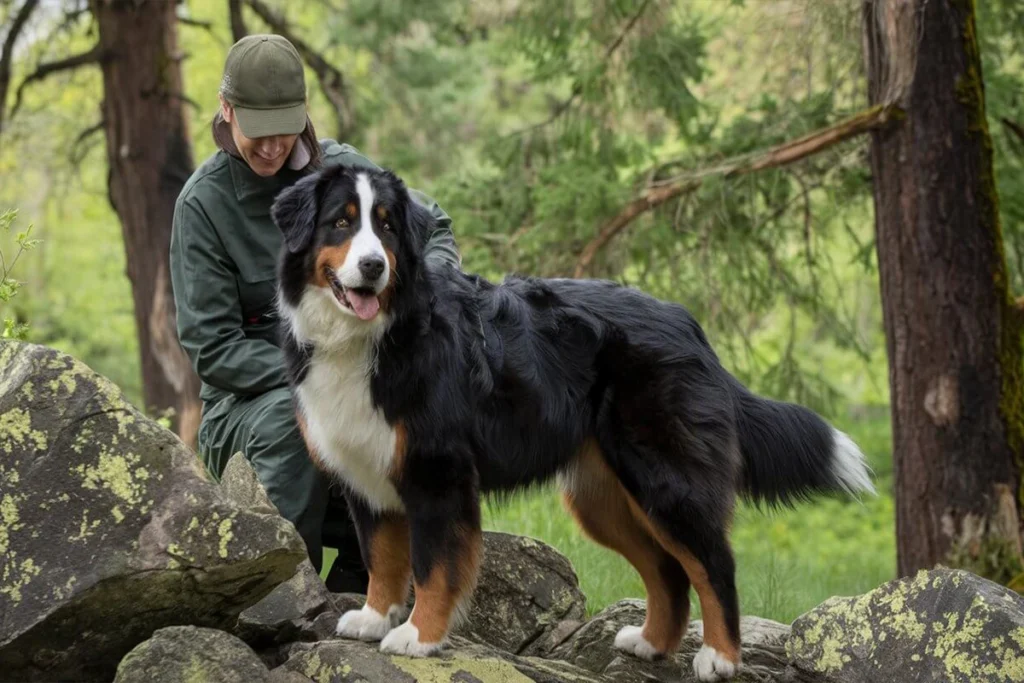
Caring for such a magnificent breed requires understanding their unique needs. They thrive in loving homes where they receive proper attention, regular grooming, and plenty of outdoor activity. Bernese Mountain Dogs are incredibly loyal but also sensitive, requiring a thoughtful approach to training and socialization.
In this ultimate guide, we’ll dive deep into everything you need to know about the Bernese Mountain Dog. From their fascinating history and physical characteristics to grooming tips, training advice, and common health concerns, this guide covers it all. Whether you’re considering adding a Bernese to your family or are already a proud owner, this comprehensive resource will help you give your gentle giant the best possible care.
Meet the Gentle Giant: An Overview of the Bernese Mountain Dog
History and Origin
The Bernese Mountain Dog has deep roots in the Swiss Alps, where it emerged as one of the four Swiss mountain dog breeds. Farmers relied on these dogs for essential tasks, including pulling carts loaded with dairy products and guarding livestock. Their origins trace back to Roman mastiff-type dogs, which were bred with local Swiss dogs to create a breed both strong and versatile. Over centuries, they became cherished working companions, praised for their ability to handle cold weather and challenging mountainous terrain.
During the early 20th century, efforts to preserve the breed intensified, especially as industrial advancements reduced the need for working dogs. Enthusiasts established breed standards, and the Bernese Mountain Dog gained recognition as a valued family companion and show dog. Today, it remains a symbol of Swiss heritage and loyalty.
Breed Characteristics
Bernese Mountain Dogs are large, powerful, and strikingly beautiful. Males typically stand between 25 and 27.5 inches tall at the shoulder, while females range from 23 to 26 inches. Their robust build is matched by a long, silky double coat, often displaying a signature tri-color pattern: a black base with rust markings and white accents.
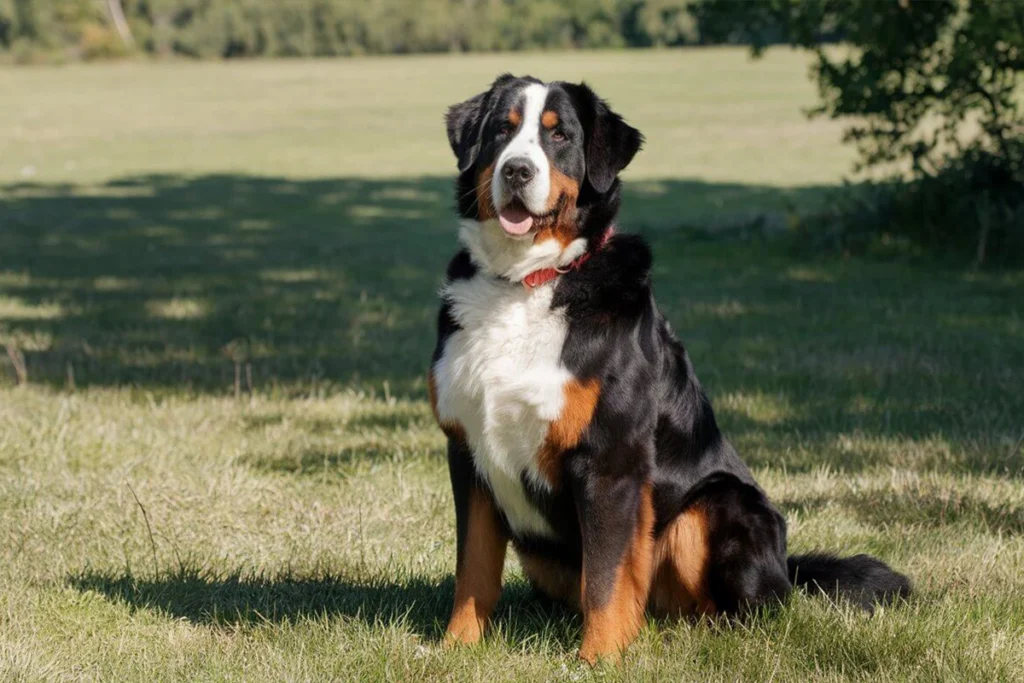
Their personality is one of the things that makes them very lovable. These dogs are affectionate, loyal, and gentle, making them excellent family pets. Despite their large size, they are remarkably patient and adaptable, thriving in environments where they feel included. However, their lifespan averages 7 to 10 years, a limitation often linked to health challenges.
Their moderate activity level suits families seeking an active but not overly energetic dog. While they enjoy physical activities like hiking or cart pulling, they also love lounging with their loved ones.
Why They’re Called Gentle Giants
The term “Gentle Giant” perfectly describes the Bernese Mountain Dog’s nature. Despite their imposing size, these dogs have a calm and loving demeanor that wins over everyone they meet. They are naturally inclined to form strong bonds with their families and display incredible patience, especially with children.
Their protective instincts are notable, but they rarely exhibit aggression unless provoked or their loved ones are in danger. Instead, they rely on their presence and deep bark to deter threats. This combination of strength and gentleness makes them ideal for families, as they excel at being both playmates and guardians.
Moreover, their gentle nature extends to their interactions with other animals. Proper socialization ensures they coexist harmoniously with other pets, further solidifying their reputation as friendly and adaptable companions.
Essential Care for Your Bernese Mountain Dog
Grooming Tips for Long-Haired Dogs
The Bernese Mountain Dog’s long, double-layered coat requires consistent grooming to keep it healthy and manageable. Regular brushing, ideally three to four times a week, helps reduce shedding and prevents tangles and mats from forming, especially around the ears, chest, and hindquarters. During seasonal shedding periods, which typically occur in spring and fall, daily brushing may be necessary to control the increased hair loss.
Bathing should be done every six to eight weeks or when your dog becomes noticeably dirty. Use a high-quality dog shampoo formulated for long-haired breeds to keep their coat clean and shiny without stripping essential oils. After baths, ensure their thick coat dries thoroughly to prevent moisture from lingering, which can lead to skin issues.
Special attention should also be given to their ears, as their floppy nature can trap debris and moisture, increasing the risk of infections. Make sure to clean their ears once a week using an ear cleaner recommended by the vet. Regular nail trimming and dental care are also crucial for their overall health.
Exercise Needs
Bernese Mountain Dogs are active and enjoy outdoor adventures, but they aren’t as high-energy as some other large breeds. They thrive on moderate, consistent exercise to maintain their physical health and prevent boredom, which can lead to destructive behaviors.
Daily walks, lasting 30 to 60 minutes, are essential. These dogs love exploring nature, so hiking or long walks in parks can be particularly enjoyable for them. They’re also well-suited for activities that engage their working heritage, like cart pulling or carrying small loads during walks.
Because they’re a large breed prone to joint issues, avoid intense activities like running or jumping, especially during their puppyhood when their bones and joints are still developing. Instead, focus on low-impact activities like swimming or leisurely strolls. Always be mindful of their tolerance to heat; their thick coat makes them susceptible to overheating in warm weather.
Dietary Advice
A balanced diet is key to supporting the Bernese Mountain Dog’s health and large frame. High-quality dog food formulated for large breeds provides the nutrients they need, especially during their growth stages. Puppies require a diet rich in protein, calcium, and DHA to support proper bone development and cognitive function. Overfeeding can lead to rapid growth, increasing the risk of joint problems, so portion control is essential.
Adult Bernese Mountain Dogs typically need 4 to 6 cups of food daily, split into two meals to prevent overeating and reduce the risk of bloat—a condition this breed is prone to. Choose food with a protein content of around 18-25% and moderate fat levels, avoiding fillers like corn and wheat.
Supplements like glucosamine and omega-3 fatty acids can support joint health and maintain a shiny coat. Ensure your dog has access to fresh water at all times, and consult your veterinarian to create a diet plan tailored to their specific age, weight, and activity level.
Training Your Bernese Mountain Dog: Tips and Techniques
Socialization Strategies
Socialization is critical for Bernese Mountain Dogs to grow into well-rounded, confident companions. Introduce your puppy to various environments, people, and animals early in life to help them develop positive associations. This process prevents fearfulness and fosters adaptability in new situations.
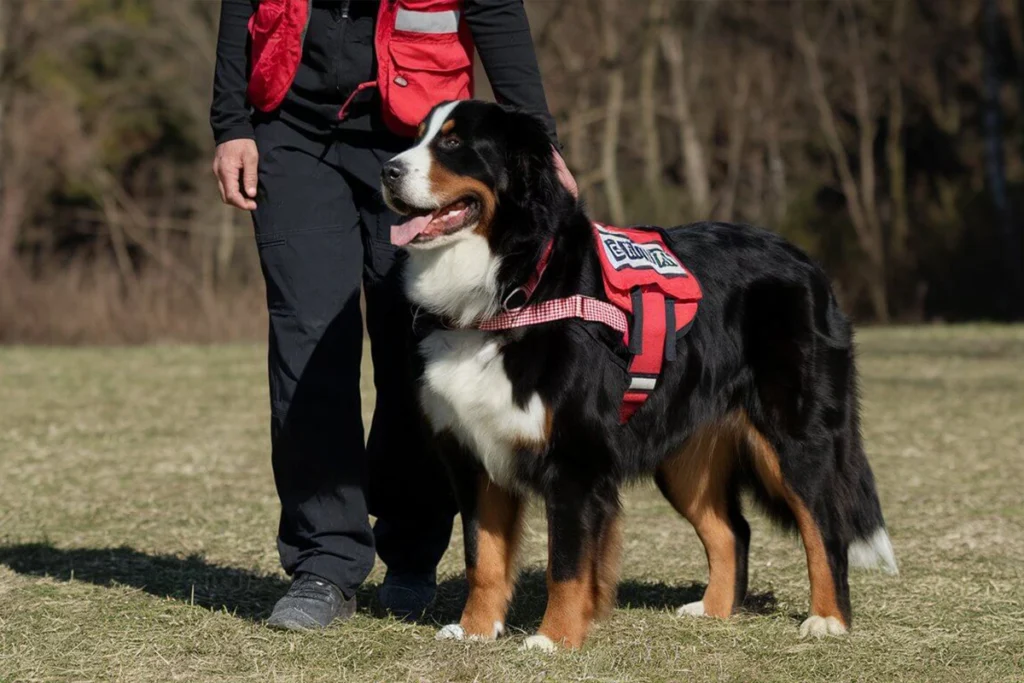
Start by exposing your dog to common household noises, like vacuum cleaners and doorbells, in a non-threatening manner. Gradually introduce them to different settings, such as parks, busy streets, and pet-friendly stores. Positive reinforcement is key—reward your dog with treats or praise whenever they handle new experiences calmly.
Organized puppy socialization classes can be invaluable. These classes allow your dog to interact with other puppies in a controlled environment, teaching them proper canine etiquette. Consistent exposure to friendly dogs and humans reinforces their natural, gentle temperament and minimizes the risk of developing aggression or anxiety.
Obedience Training Essentials
Obedience training lays the foundation for a harmonious relationship with your Bernese Mountain Dog. Begin with basic commands like “sit,” “stay,” “come,” and “down.” These large dogs are eager to please, making them responsive to training, especially when it’s reward-based. Use treats, toys, and praise to motivate them during sessions.
Leash training is essential due to their size and strength. Teach them to walk politely on a leash by starting with short walks in quiet areas, gradually introducing distractions. A no-pull harness can provide extra control during training.
Keep training sessions short and engaging to maintain their interest. Repetition and patience are vital, as Bernese Mountain Dogs can occasionally be slow to learn complex tasks. Consistency is crucial—set clear rules and expectations, and ensure all family members follow the same guidelines to avoid confusing your dog.
Activities They Love
Bernese Mountain Dogs thrive in activities that cater to their working-dog heritage and love for the outdoors. They excel in cart pulling, a traditional task they performed in Switzerland. You can recreate this by participating in carting competitions or simply attaching a dog cart for them to pull light loads during walks.
These dogs also enjoy hiking and long walks in nature. Their stamina and love for cool climates make them ideal companions for exploring trails. However, always ensure the terrain is suitable for their joints, particularly as they age.
Agility courses and obedience competitions are great ways to engage their minds and bodies. Although they may not be as quick as smaller breeds, they perform well in activities that challenge their intelligence and strengthen their bond with their owners.
Finally, Bernese Mountain Dogs enjoy social playtime, either with other dogs or their families. They’re gentle enough to play with children and often revel in backyard games like fetch. These activities keep them happy and help prevent behavioral issues stemming from boredom.
Common Health Issues in Bernese Mountain Dogs and How to Prevent Them
Understanding Health Risks of Bernese mountain dog
Bernese Mountain Dogs are generally healthy, but like many large breeds, they are prone to specific health concerns. One of the most common issues is hip dysplasia, a genetic condition where the hip joint doesn’t develop correctly, leading to arthritis and discomfort. Another frequent concern is elbow dysplasia, which affects the front limbs.
Bloat (gastric dilatation-volvulus) is another serious condition that can be life-threatening. It happens when the stomach fills with gas and turns, stopping blood from flowing. Bernese Mountain Dogs, due to their deep chests, are particularly susceptible to this.
Cancer is, unfortunately, a leading cause of death in Bernese Mountain Dogs. They have a higher-than-average risk for certain cancers, including histiocytic sarcoma and lymphoma. Other common issues include joint problems like arthritis and degenerative myelopathy, a progressive spinal cord disease.
By understanding these risks, owners can take proactive measures to ensure their dog lives a long, healthy life.
Preventative Care
Preventative care starts with regular vet visits, at least once or twice a year, to catch potential health issues early. Annual screenings for joint problems, heart health, and bloodwork can help monitor for common conditions.
For hip and elbow dysplasia, maintaining a healthy weight and avoiding excessive strain on joints is crucial. Controlled exercise, particularly in puppies, helps prevent overexertion during their growth stages. Supplements such as glucosamine and chondroitin can help keep your joints healthy.
To reduce the risk of bloat, feed your dog smaller meals twice a day instead of one large meal. Avoid vigorous exercise immediately before or after eating, and consider using a slow-feeder bowl to prevent gulping air while eating.
Cancer prevention relies heavily on early detection. Regularly check for lumps or unusual growths and consult your veterinarian if you notice any changes. A high-quality diet rich in antioxidants can also support overall health and potentially reduce cancer risk.
Routine dental care, ear cleaning, and grooming contribute to overall health, preventing infections and other secondary issues. Additionally, keeping your Bernese Mountain Dog up-to-date on vaccinations and parasite preventatives ensures they stay protected from diseases and pests.
Signs to Watch For
Recognizing early signs of health issues is vital in large breeds like the Bernese Mountain Dog. For joint problems, look for limping, stiffness, difficulty getting up, or an unwillingness to climb stairs. These symptoms could indicate hip or elbow dysplasia or arthritis.
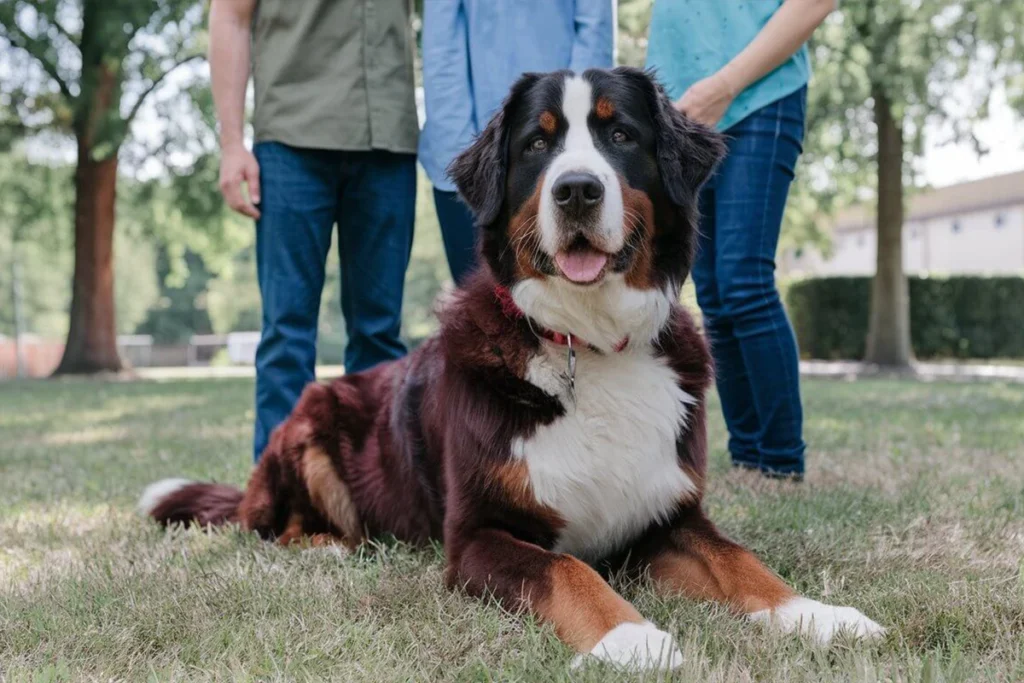
Signs of bloat include restlessness, a swollen abdomen, excessive drooling, and unsuccessful attempts to vomit. This condition requires immediate veterinary attention.
For cancer, watch for unusual lumps, persistent sores, weight loss, lethargy, or a change in appetite. While these symptoms don’t always mean cancer, they warrant a visit to the vet.
Keep an eye out for general signs of illness, such as changes in behavior, appetite, or energy levels. Excessive panting, coughing, or difficulty breathing may point to heart or respiratory issues. If your dog shows any of these symptoms, early intervention can make a significant difference in their prognosis.
Is the Bernese Mountain Dog Right for Your Family?
Lifestyle Compatibility
The Bernese Mountain Dog is a breed that thrives in environments where they can actively participate in family life. Their calm and affectionate demeanor makes them ideal for households with children, as they are patient and gentle. These dogs love to be included in everyday activities and are happiest when surrounded by their loved ones.
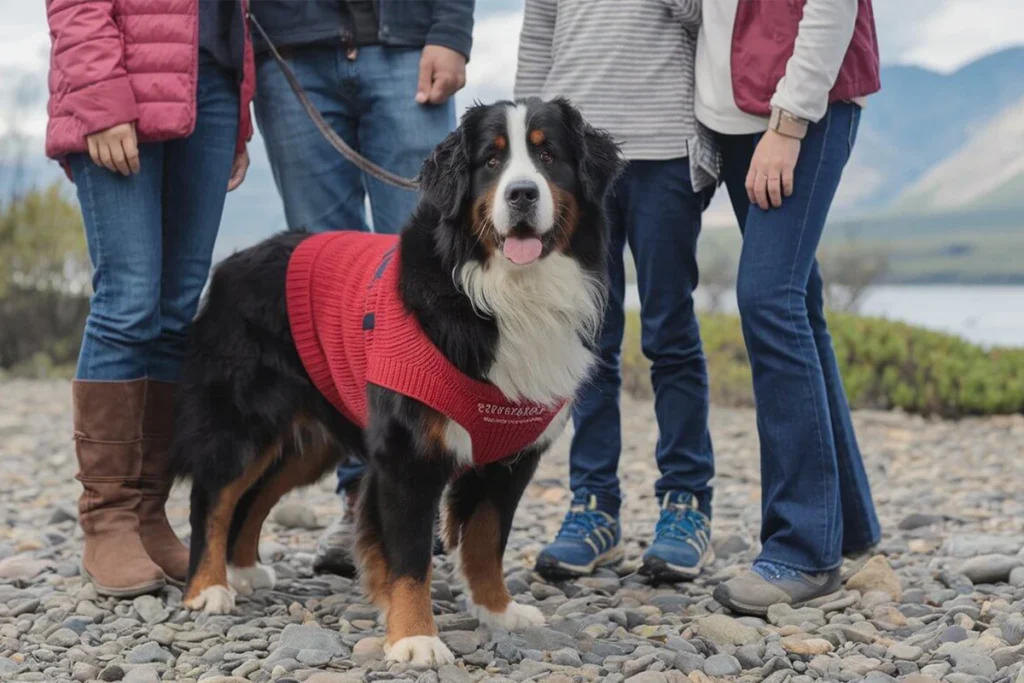
They adapt well to suburban or rural living, where there’s space for them to roam and explore. Large yards are a bonus, but they’re not a substitute for regular walks and outdoor playtime. Bernese Mountain Dogs are better suited for cooler climates due to their thick double coat. In hot weather, they need extra care to avoid overheating, such as access to shade and plenty of water.
While they are loyal and protective, they are not overly aggressive, making them wonderful companions for families looking for a friendly and reliable dog. However, their size and activity needs mean they may not be the best fit for apartment living unless owners are committed to providing ample exercise and enrichment.
Ideal Owners
Bernese Mountain Dogs are best suited for owners who can dedicate time and attention to their care. They thrive in families with children or individuals who enjoy outdoor activities like hiking, walking, or even light cart-pulling exercises. Active households that value companionship and can meet the breed’s social needs will find these dogs an excellent match.
They are also a great fit for first-time dog owners due to their eager-to-please nature and relatively straightforward training requirements. However, patience is essential, as they can be a bit slow to mature both mentally and physically. Owners who are willing to invest in early training and consistent routines will reap the rewards of a well-behaved and devoted dog.
Retirees or people who work from home can also make excellent Bernese owners, as this breed dislikes being left alone for extended periods. Families with flexible schedules or those who can integrate their dog into their daily lives are ideal matches.
Famous Bernese Mountain Dogs
The Bernese Mountain Dog’s charm and beauty have earned them a place in the spotlight, appearing in media and winning hearts worldwide. While they’re not as commonly featured as some breeds, they’ve made notable appearances in movies, advertisements, and as beloved pets of celebrities.
One famous Bernese Mountain Dog is Bella, featured in the popular children’s movie Snow Dogs, where her gentle nature was showcased on-screen. Similarly, in the movie Good Boy!, a Bernese Mountain Dog named Barbara demonstrates the breed’s characteristic loyalty and charm.
In real life, celebrities like Hilary Duff and Courteney Cox have owned Bernese Mountain Dogs, further highlighting their popularity as loving companions among the rich and famous. These dogs often make headlines for their appearances at events and their ability to steal the show with their striking tri-color coats and calm demeanor.
Their participation in dog shows also adds to their fame, where they are admired for their beauty, obedience, and strong work ethic in cart-pulling competitions. Whether as family pets or stars in their own right, Bernese Mountain Dogs continue to win hearts wherever they go.
You can Discover more about Breeds on PawPits Official website
Conclusion
The Bernese Mountain Dog is more than just a strikingly beautiful breed—they are loyal, gentle, and versatile companions who bring joy and devotion to any family lucky enough to have them. Their history as working dogs in the Swiss Alps highlights their strength and endurance, while their modern role as affectionate family pets showcases their adaptability and loving nature.
Caring for a Bernese Mountain Dog requires commitment, as their grooming, exercise, and health needs can be demanding. Regular brushing, consistent physical activity, and a well-balanced diet ensure that they remain happy and healthy. Early training and socialization are equally important, helping them develop into well-mannered and confident dogs. Despite their large size, they are incredibly gentle, making them wonderful with children and a great choice for families seeking a patient and affectionate companion.
While their lifespan is relatively short compared to smaller breeds, the years spent with a Bernese Mountain Dog are filled with loyalty, fun, and unconditional love. Their ability to form deep bonds with their families is unparalleled, and they often become the heart of the household. For individuals or families who can provide the time, care, and attention this breed deserves, a Bernese Mountain Dog can be a perfect match.
Remember!
Whether you’re drawn to their regal appearance, their friendly and calm demeanor, or their history as a working breed, the Bernese Mountain Dog is a remarkable choice for those seeking a loyal and loving companion. They are not just pets—they’re cherished members of the family, always ready to offer their unwavering devotion and brighten your days with their affectionate nature.
If you’re considering welcoming a Bernese Mountain Dog into your home, take the time to prepare for their needs and ensure your lifestyle aligns with theirs. In return, you’ll gain a devoted, gentle giant who will leave pawprints on your heart forever.
Find The Top Key Differences Between Greater Swiss Mountain Dog vs Bernese Here.
You Can Learn More about The Other Dogs & Breeds Here.
Discover His Other Giant Brother “Greater Swiss Mountain Dog“
Find The Best Stuff For your Pet on PetMD Official.
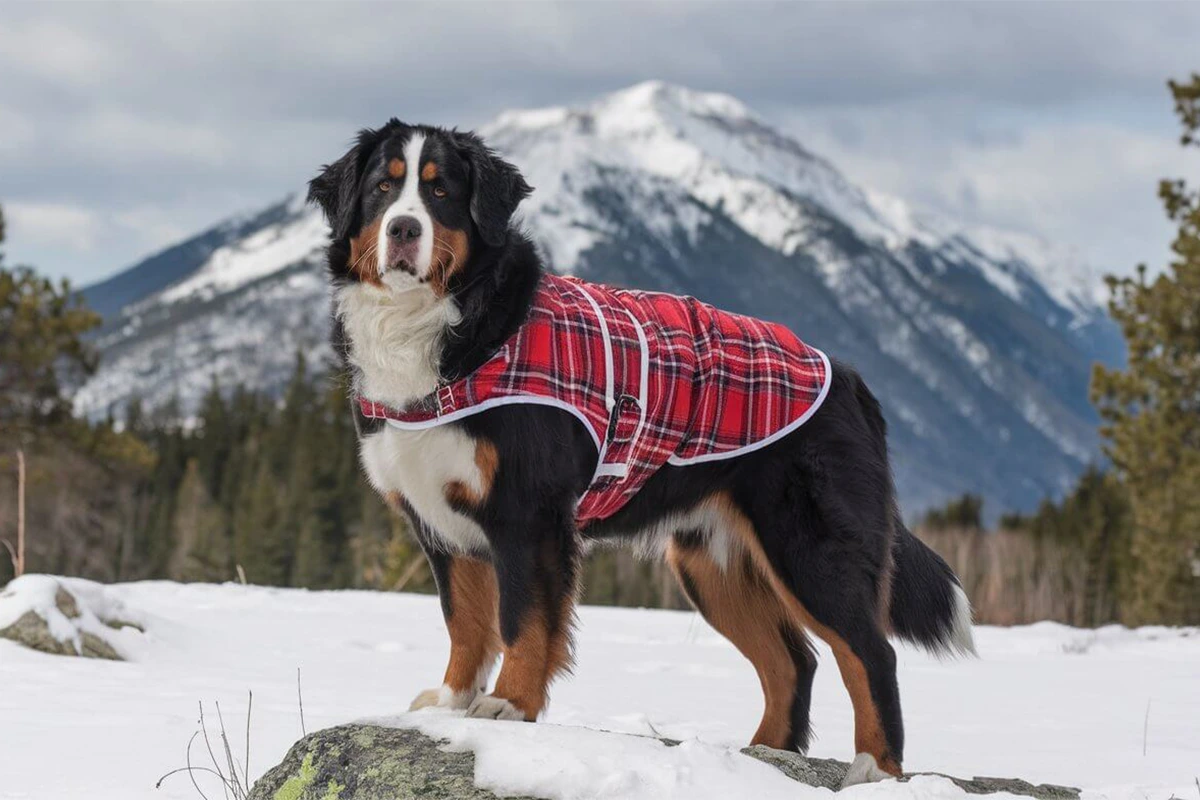
4 thoughts on “Bernese Mountain Dog: The Ultimate Guide to This Gentle Giant”
Comments are closed.